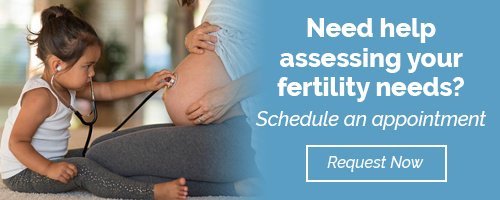Published
If you're having trouble getting pregnant, you can find support in knowing that you're not alone.
Female fertility challenges are actually more common than most people think. It's estimated that roughly 10% of women in the U.S. between the ages of 15-44 have issues with achieving or maintaining pregnancy. The odds become even more difficult to beat if a woman is over the age of 35 when trying to conceive. To give you a refresher, infertility means that a women is not able to get pregnant after a year of consistent effort (a 6-month period for those over the age of 35), so if you find yourself in this category, it may be time to seek medical advice or fertility treatments.
It's important to remember that each person is different. Problems and solutions for some people may not be the same for others. However, there are many reasons why women have infertility issues, and being aware of the challenges will help you stay prepared for the road ahead.
Common Fertility Challenges that Women Face
According to the American Pregnancy Association (APA), the female partner is responsible for 50% of all infertility cases. Although these instances can be caused by a number of different reasons, here are the most common fertility challenges that women face:
Ovulation Issues
Out of that 50% of infertility cases, ovulation issues account for nearly half. Being able to identify and maintain your ovulation schedule, within a few days, is crucial to achieving a healthy pregnancy, so if anything is disrupting that pattern, it can make having a child extremely difficult.
Problems with ovulation can include:
- Polycystic Ovarian Syndrome: Small cysts form on the outer edge of the ovaries, preventing the egg from traveling through the fallopian tubes to the uterus.
- Endometriosis: Protective tissue that lines the inside of the uterus (endometrium) grows outside of it. This condition causes severe pain in the pelvic area, affecting the ovaries and fallopian tubes. It can also cause painful or heavy menstruation.
- Primary Ovarian Insufficiency: Early menopause occurring in women under the age of 40. The ovulation process shuts down completely, ending the menstrual cycle for unknown reasons. However, it is believed that certain genetic factors contribute to its onset (Turner Syndrome, Fragile X Syndrome).
Keep in mind, issues with ovulation may be the reason for unsuccessful pregnancies, but often, the root of a problem stems from other sources, such as infections, cancers, hormonal changes, and one's personal health.
Damaged Fallopian Tubes or Uterus
A healthy egg must travel from the ovaries through the fallopian tube and attach itself to the uterus for a pregnancy to begin. It's a process that requires each part to function properly, but often, something along the way jeopardizes course. In relationship to ovulation issues, the other half of female infertility cases is made up of tubal and peritoneal factors.
Here are a few roadblocks that an egg might face after leaving the ovaries:
- Salpingitis: An infection that causes swelling to the fallopian tubes. If left untreated, adhesions, blockages, or scarring can lead to infertility.
- Pelvic Inflammatory Disease (PID): When parts of the female reproductive organ become infected. This can involve the ovaries, fallopian tubes, or uterus, and a woman may not know that she has an infection until infertility persists or pelvic pains starts to occur. PID often comes from bacteria spread through an STD (gonorrhea, chlamydia).
- Uterine Fibroids: Small tumors (typically benign) that grow inside the uterine wall (womb) and potentially cause disruption to pregnancies.
Understanding the vulnerability of the reproductive organs can help increase your diligence and awareness as you move through your journey to becoming pregnant. Physical issues present a game plan of diagnosis and treatment. On the other hand, when female fertility challenges are unseen, finding a solution can be tough.
Hormonal Changes and Illnesses
Aside from what's generally the cause of infertility, its important to remember that hormonal changes or underlying medical illnesses are often related to the onset of other issues.
Here are a few ways that hormones and other illnesses affect fertility:
- Irregular, Heavy, or Painful Menstruation: Hormones firing and processing at the correct times will produce a steady 28-day menstrual cycle (on average). However, fluctuating hormones will produce irregular menstruation, which can lead to excessive bleeding and painful cramps. These factors contribute to infertility by couples missing the ovulation window or disrupting one's daily life (painful menstruation could also be a sign of endometriosis).
- Hyperprolactinemia: Hormonal changes in the pituitary gland causes too much prolactin in a person's bloodstream. High levels of prolactin are linked to irregular periods, reduced estrogen, and difficulties with ovulation.
- Hyperthyroidism: The thyroid helps regulate energy use throughout the body, so one that is overactive will expel energy too quickly, leaving the host fatigued or exhausted. This lack of energy can cause irregular periods, which can lead to fertility issues.
- Obesity, Lack of Exercise, Eating Disorders: Being overweight has a tremendous effect on one's reproductive health. Constant inactivity combined with hormone fluctuations, insulin resistance, and decreased fertility will make procreation increasingly difficult. In addition, eating disorders (bulimia and anorexia) can also negatively impact fertility due to poor nutrients and maintaining a healthy weight to conceive.
- Cancer Treatments: Along with the difficulties of battling cancer, cancer treatments, such as chemotherapy and radiation therapy, can have harmful effects on reproductive organs, which can lead to increased infertility.
- Celiac Disease, Diabetes, Lupus, Amenorrhea: Each one of these diseases can negatively impact fertility and should be taken into consideration when trying to get pregnant.
Everything listed here are certainly challenges to overcome, but unfortunately, dealing with just one issue won't be the case for most people. To give yourself the best odds of achieving a healthy pregnancy, you must put yourself into a position to succeed. This means making life changes that promote a healthier well-being. Aside from just pinpointing the cause of your infertility, make a commitment to avoid additional risk factors that can hurt your chances, speak with medical professionals to discuss your options, and make a plan with your team to have the family you've always wanted.
Thankfully, once you're ready to get started, we're here for you.

Fertility Treatments and What to Expect
When it comes to infertility, trust that there are industry professionals out there who are eager to help!
Kofinas Fertility Group specializes in addressing fertility issues, while giving you a detailed treatment plan specifically designed to meet your needs. Rather than jumping right into a diagnosis, you will undergo an in-depth fertility assessment to pinpoint the nature of your fertility problems.
Understanding Your Fertility Assessment
This video covers what to expect at your workup appointment.
To get started, a fertility specialist will give you a general assessment to have a complete understanding of your issues. Once the source of your infertility is discovered, a treatment plan will be put into place to give you the best possible chance of having a successful, complication-free pregnancy. There are several fertility treatment options. During your assessment, you will experience the following procedures:
- Ovulatory Function Evaluation: Analyzing your ovulatory cycle and using that information to develop a strong treatment plan.
- Imaging: Ultrasound and X-ray imaging to examine reproductive tract, discover any major issues, and develop targeted therapies.
- Sample Testing: Gathering reproductive samples to understand any issues or abnormalities that can prevent a healthy pregnancy.
For each individual, different treatment options will be administered, but to give you a basic idea of what routes are available, here are a list of fertility therapies that Kofinas Fertility Group specializes in:
- Low-complexity therapies
- Cryopreservation
- In vitro fertilization
- Genetic testing
- Donation & Surrogacy
- Surgical procedures
Although there are different therapies to utilize, Kofinas Fertility Group generally reserves low-complexity therapies as the first wave of assistance for those experiencing relatively uncomplicated fertility issues. The reasons behind this approach are that low-complexity therapies are less expensive and less invasive, while still promoting a high rate of success.
In some cases, a combination of the two main low-complexity therapies (intrauterine insemination and ovarian stimulation) will be used together to provide you with an optimal outcome. In addition, certain ovarian stimulation medications will be prescribed to help prepare the body for a health pregnancy.
Natural Ways to Increase Fertility
To go along with your treatment plan, Kofinas Fertility Group also advocates for natural methods of stimulation that can increase fertility. It's understandable that some patients aren't as comfortable with fertility treatment options that include medical procedures and medication, but these alternatives are worth exploring if you're looking for more of a holistic approach.
- Yoga: Calming techniques that are grounded in meditation can improve fertility and stimulate the reproductive organs. Fertility yoga utilizes a combination of breath, relaxation, and muscle development to engage with the body and create a vessel of harmony and tranquility for your pregnancy.
- Acupuncture: Ultra-thin needles are strategically inserted around the body to access natural meridians and create stimulation. In addition to herbal medicine, acupuncture has been used for hundreds of years to treat infertility. It can also treat other issues that affect fertility, such as hyperthyroidism.
- Dieting: Eating a well-balanced diet that is rich in antioxidants will nourish your body and prepare it for a healthy pregnancy. For a list of foods and plans to consider, here is a helpful link.
Kofinas Fertility Group is dedicated to presenting you with options that you feel comfortable with. Our ultimate goal is to help you obtain the family of your dreams, and we support individuals and couples of all backgrounds when striving for that goal.
Supporting the LGBTQ Community
More than ever, the family dynamic is changing, and Kofinas Fertility Group is proud to lead the movement of a more diverse and unique future.
For individuals or couples who identify with the LGBTQ community, we have specialized fertility approaches to help you along the way. Specifically for lesbian couples, you will undergo the same fertility assessment to locate any issues or concerns. In most cases, an in vitro fertilization (IVF) or intrauterine insemination is recommended. However, there are several other choices to consider if the option is available:
- One partner will donate an egg while the other carries out the pregnancy.
- One partner can carry the egg and fulfill the pregnancy.
- A sperm donor can be provided by a friend, relative, or anonymous donor.
- A gestational carrier can be arranged if both partners are not able to carry or provide an egg.
What's important is that you have options, as well as a team of professionals encouraging you along the way. As long as you're committed to achieving a healthy pregnancy, Kofinas Fertility Group will be there every step of the way.
No matter what your challenges are with fertility, you can rest assured that assistance is out there. New legislation, known as FAFTA passed the state legislature and can help too. If you're ready to see what options are available to you, schedule your fertility assessment today.




